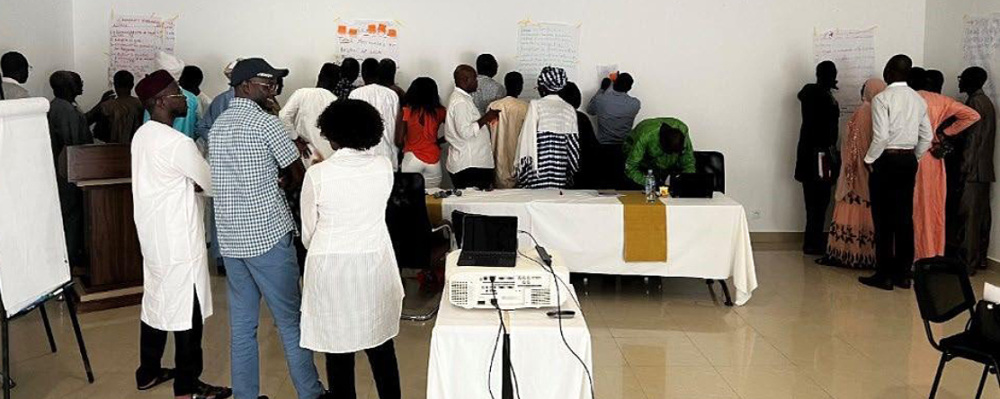
Capacity Building for Global Health Leadership Training
- David Hausner, PhD, MPH, MIA
- Bhakti Hansoti, Daniela C. Rodríguez, Anike Akridge, Caroline Dolive, Melanie Atwell, Meike Schleiff
-
Focus Areas
Capacity Building & Leadership, Global Health -
Programs
Sustaining Technical and Analytic Resources (STAR)

This special collection in the Annals of Global Health, edited and written in part by contributors from PHI’s Sustaining Technical and Analytic Resources (STAR) program, shares key strategies to meet global public health and healthcare delivery needs by building the capacity of local leaders in low- and middle-income countries.
Topics include experiential learning and mentorship; evaluating programs for sustainable impact; building effective partnerships; strategies for gender equity and empowerment; and more.
See the special collection
Designed as roadmap for implementers, educators and investors, the eight articles are written by an interdisciplinary group from all over the world, representing their diverse perspectives on leadership, global health, training, education and health.
This collection was guest-edited in part by PHI STAR’s B
Access the individual articles:
- Experiential Learning and Mentorship in Global Health Leadership Programs: Capturing Lessons from Across the Globe Authors: This paper builds on the co-authors’ experiences as trainees, trainers, organizers and evaluators of six global health leadership programs to reflect on lessons learned regarding experiential learning and mentoring (ELM). We also consider ethics, technology, gender, age and framing that influence how ELM activities are developed and implemented. Lead author: Daniela C. Rodríguez, PHI’s STAR.
- Gaps, Challenges, and Opportunities for Global Health Leadership Training: This paper describes the lessons learned, highlighting gaps, challenges and opportunities, during implementation of two global health leadership capacity building programs, namely the Afya Bora Consortium Fellowship in Global Health Leadership and the Sustaining Technical and Analytic Resources (STAR) fellowship and internship program for global health professionals. Co-authors include Anike Akridge and David Hausner, PHI’s STAR.
- Measuring for Success: Evaluating Leadership Training Programs for Sustainable Impact: This article identifies the gaps and highlights the critical role of monitoring and evaluation approaches in assessing the impact of global health leadership programs. Importantly, we also propose the theory of change (TOC) as a common framework and identify a set of tools and indicators that leadership programs can adapt and use. B
- Training Curriculum, Skills, and Competencies for Global Health Leaders: Good Practices and Lessons Learned: This paper compares and contrasts three leadership programs for global health in order to enable other training institutions to design impactful curricula: The Afya Bora Consortium Fellowship in Global Health Leadership, The Sustaining Technical and Analytic Resources (STAR) Project, and Global Health Corps (GHC)). B
- Training Global Health Leaders: A Critical Review of Competency Gaps: In order to develop impactful training curricula, there is a greater need to understand the areas of focus required to strengthen the global health workforce. This paper seeks to present a critical analysis of the competency gaps among participants of a single global health training program, the Sustaining Technical and Analytic Resources (STAR) Project. Blead-author and Caroline Dolive, Anike Akridge, Melanie Atwell, and Meike Schleiff are co-authors.
- Building and Sustaining Effective Partnerships for Training the Next Generation of Global Health Leaders: We provide key matrices that predict success of partnerships in building global health leadership capacity. We highlight opportunities and challenges to building effective partnerships and provide recommendations to promote development of equitable and mutually beneficial partnerships.
- More Women Must Lead in Global Health: A Focus on Strategies to Empower Women Leaders and Advance Gender Equality: Greater diversity in global health leadership, particularly greater representation of women, is essential to ensure diverse perspectives and ideas inform policies and priorities. Interviews and literature reviews surfaced many of the key challenges that women in global health face at individual, organizational and societal levels. Initiatives working to advance women’s leadership are encouraged to consider 5 key priorities that address these challenges.
- Delivering Modern Global Health Learning Requires New Obligations and Approaches: We describe a set of multi-communication methods, e-Learning principles, strategies, and information and communication technology (ICT) approaches for educators to pivot content delivery from traditional, face-to-face classroom didactics into the modern era. These best-practices in both the obligations and approaches utilize thoughtful, modern strategies of instructional design and ICT. B
Originally published by Annals of Global Health
Work With Us
You change the world. We do the rest. Explore fiscal sponsorship at PHI.
Support Us
Together, we can accelerate our response to public health’s most critical issues.
Find Employment
Begin your career at the Public Health Institute.


